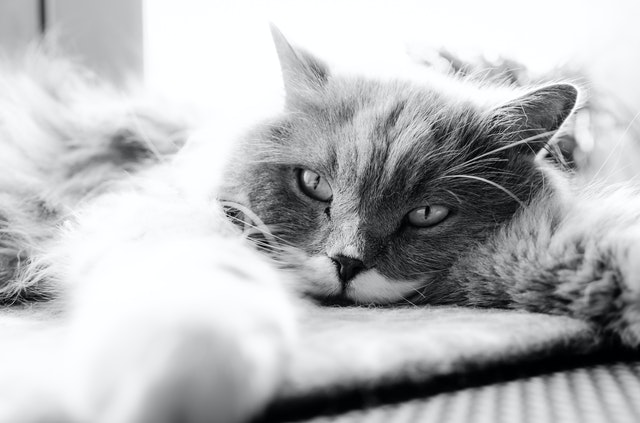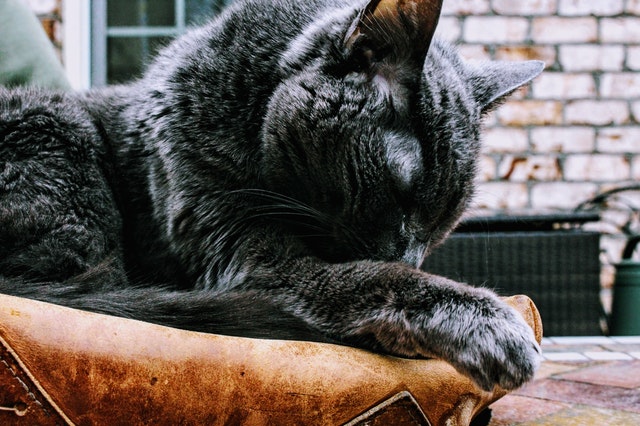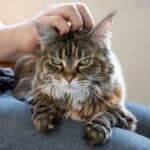Separation anxiety is a real thing! We have seen it happen with children, adults, dogs and even cats. Learning how to help your Maine Coon through these issues will be a great benefit to her, and make life a little easier for you.
We can say that of all animals, felines are the ones that seem to be aloof, like solitude or just plain and simple, not social. It does come as a slight surprise that cats do experience the same feelings as children and dogs do. When their human is not there, near them for a period of time, they may get scared, worried and in turn have separation anxiety.
Jump to:
Stress in Cats
In recent studies, it has been shown that the majority of cats, about 65%, show less stress when their human is near. Yes, cats have stress! This is not something we would consider on a daily basis, but it is entirely possible. Those times when there is a greater amount of sound, noises, people and a general feeling of anxiousness, the felines will experience stress.
Causes of Separation Anxiety

Cats will exhibit odd behaviors when they are stressed. There are things that will cause this separation anxiety in cats. One is being a female feline. There is no definitive reason for this, however, female cats are diagnosed as having separation anxiety far more often than male cats are.
Being a cat that lives strictly indoors is seen as another cause of separation anxiety. This could also be mistaken as loneliness. If there are no other pets in the home, and the home only has one adult caregiver.
Studies have also shown that cats that have been weaned too early, orphaned or stranded and left off alone will experience separation anxiety. Even a simple change in routine could cause a cat to experience separation anxiety. Something as simple as your work hours shifting by an hour or two will be seen as an issue.
Signs of Separation Anxiety
How will you know if it is separation anxiety that your cat is experiencing? They give a few signs that will show you they are experiencing something that is not normal for them.
- Excessive Grooming
- Loud and constant meowing, crying and moaning
- Eating rapidly, or not eating at all
- Defecating or urinating outside of the litter box
- Trying to get out the door when it is opened, or through a window, trying to escape
- More hairballs than is normal.
Although many of these may be a hassle for the majority of us humans, for your furball, it is a way to let you know that something is wrong. For instance, elimination outside of the litter box is a sign that they are trying to mix your scent with theirs. Believe it or not, your cat may also see their behavior as a way of showing you how to get back home. Keep in mind, the feline has instincts that run very deep inside of them.
What Help You Can Give
There are a few things that you can do to help your cat remain calm while you are gone. I am sure that there are many others, and we would welcome any suggestions. Until then, here are some ideas that we find the best ways to help when your cat is experiencing Separation Anxiety.
One major point is to avoid letting them know that you are leaving. Saying good-bye, Mommy will be home soon, any of those types of statements will tell the cat that he or she is about to be alone for a while.
Sometimes, if you can leave the radio on or the television, at a very low volume; it would benefit the furbaby by letting it think that you are there. If they hear voices, they do not feel as though they are alone. Design a special area for your cat. If at all possible, make a super soft bed by a window that the cat is able to see outside. Watching birds and cars travel past may give them a sense of the world is all okay.
Not all cats enjoy cat treats, however, if you have one that does like treats, hide some. Do not place them in areas where the cat does not go, rather place them inside a toy, on the bed where you sleep, or even in their favorite areas. Hide some so they will have to work to find them, but do not make it too difficult for them.
Your vet can provide you with room diffusers with calming pheromones. These will not affect the humans in the room, but will help to calm the cat down. Even the big tough Gentle Giant Maine Coon will experience moments of panic and need to calm down.
If the separation anxiety is extreme, you may want to consider having a pet sitter stop over in the middle of the day. If they can play for a short time, it will help break up the length of time that your baby is missing you.
When you do arrive home, be sure to give your Maine Coon cat some extra love and attention. When you first walk in the door, say hello and give cuddles. It is likely the cat will follow you around for a period of time. Continue to do what you need to do, then give your fur baby more affection and cuddle time. Make playtime fun for the furball.
Further Assistance

Sometimes you will find that your Maine Coon is still having a rough time dealing with the separation anxiety. There are other steps that may be necessary. Behavior modification is when you want to change the behavior the cat is exhibiting. Do not give attention to any negative behavior.
You will want to focus on rewarding your Maine Coon when they give positive behavior, when they show independence and when there is no destructive or offensive behavior done. You want to ignore the attention seeking behavior and focus on the calmer times, especially when it is not playtime.
Provide Enrichment
When you know that you are going to be gone, be sure to have some puzzle toys that they play with to figure out how to get the treats out. Hunting for their food is one of those things that cats have a deep instinct for.
That instinct may not be something they rely on now, since you are there to feed them, however, it is ingrained into their systems. When you can find ways to get them to use their deep rooted instincts to solve the situation in front of them, it helps them occupy time and use the knowledge they have.
There are actually channels on some cable systems that are meant for cats and dogs. These are there to help ease anxiety in your cat. There are cameras that can be set up that will allow you to check in at home and see how your baby is doing. You can talk to your cat or sing a song, whatever it is that will help your cat to remain calm.
In summary, rather than being baffled, getting upset or not understanding why your Maine Coon or other feline is acting out so drastically, try to understand that just as you need to get out and see other people, you need to be interactive with others, so does your furry feline. If your cat is strictly an indoor cat, even more importantly they need interaction.
Cats are a rather routine creature. They live by routine, sleep by routine, eat on routine. Basically, we created that routine for them when we became their owners. When it is just the two of you living together, routine will help to keep this baby calm while you are at work, out running errands or just at the gym.
Develop a routine with your cat in mind, give them a treat before you leave, hand them a treat upon your return. Something that will acknowledge that they are on your mind will help them to stay calm. And remember, there will be no instant changes, some cats may be affected more than others with separation anxiety. Some may not even seem bothered by your absence at all.
However your cat acts, be there! If the behavior seems to get worse and nothing you have tried seems to help, consult your vet. The vet or his or her staff may have some quite solid and helpful ideas they can give you. Besides, it is always wise to keep your vet in the loop of what is happening with your maine Coon or other feline breed.
If the vet determine that your Maine Coon has a severe case of separation anxiety, he or she may recommend medication. Even if it is just a temporary basis. It will help the cat become used to the routine of your absence during the day. They will learn to understand that you always come back home to them.




